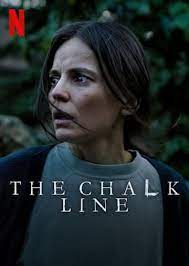
JAULA/ THE CHALK LINE
Spain, 2022, 104 minutes, Colour.
Elena Anaya, Pablo Molinero, Eva Tennear, Eva Llorach, Carlos Santos.
Directed by Ignacio Tatay.
An arresting Spanish drama. The Spanish title actually means Cage. The English title of The Chalk Line, illustrated throughout the film, is a very effective title.
This is a strong drama – which involves the audience and, perhaps, enables them to accept what, in strict realism, might not have happened in the way it is presented here.
A couple, Paula and Simon, driving home see a little girl in the middle of the road, a cyclist coming towards her and skidding, the girl not hurt, and the couple taking her to the hospital. She doesn’t speak. She is unwell, kidney troubles. She is kept at hospital.
The couple, especially Paula, a very keen to do what they can for the little girl whose name seems to be Clara. But, no speaking, and her fear of moving of the limits of the bed in hospital. The hospital psychologist tries to entice her to speak. Various visits to the hospital, Clara seeming to trust Paula, the decision then that she should go home with Paula and Simon.
So, some detail in Paula’s working with Clara, Clara eventually whispering into Paula’s ear, some tapes made of the whispering, the emergence of some German words. But, Clara can be cantankerous, refusing to play with the daughter of a neighbour. And, using the device of the chalk line, which can always be extended, Clara venturing more and more from enclosure. In the meantime, the neighbours come to visit, offering help and advice. And, also in the meantime, the audience sees Paula taking injections, hiding them from her husband, his discovering them and their discussions about this six years in trying to become pregnant.
When the authorities want to take Clara back to the hospital, Paula becomes more intense, especially in looking at a drawing that Clara has done – and Clara disappearing, reappearing, disappearing again. Paula becomes even more obsessive, going to the police with suspicions, her stealing records of similar cases of little girls disappearing, this taking her to the French police, and some discoveries in the files.
At which stage, the chronology goes back, repetition of sequences but, from the point of view of a neighbour who arouses Paula suspicions – and, then some revelations, some connections, the neighbour and his tension with his wife, and the final resolution.
Perhaps it seems less plausible is reflect on the film after it ends – but, while it is on the screen, it does involve us emotionally and with curiosity.
- The Title, literally “Cage”? The chalk line throughout the film?
- The Spanish setting, the highway, the hospital, the home, exteriors, the neighbours? Police precincts? The musical score?
- Paula and Simon, driving, the little girl on the road, the crash, taking her to the hospital, the mystery, their care?
- The little girl, age 6, not speaking, her health, beginnings of recovery? The nursing staff? The psychologist? Paula and Simon and the interest on visits? (And Paula and the later history of trying to be pregnant, her desire for a child, for six years, the injections, keeping at this secret from Simon and his feeling that she had taken this from him?)
- Paula, her age, motherly instinct, the visits to the hospital, the interactions with the little girl, the confines of the bed? Taking her home, drawing the chalk lines? Paula and Simon involved? His having to go to work, his care, but the main work for Paula?
- The neighbours, the visits, the meals and discussion, the audience taking the friends for granted – the mother and her pregnancy, the discussion about the birth date, Eduardo and audiences not noticing him much, the importance for later?
- Audience response to Paula and her care for Clara, the little girl, some German words and the later discoveries of the translations, her whispering to Paula, the yoghurt, the neighbour, refusing to play with the little girl? The bonding between Paula and Clara? The visits from the psychologist?
- The negative behaviour, the episodes with the glass in the drink, the pregnant mother, Paula? And the irony of discovery that Eduardo had put the glass in the drinks?
- Simon, worried, the confrontation about the injections and pregnancy? Paula, becoming more moody, the disappearance of Clara, later finding her with Simon? Her final disappearance, Paula and the police, stealing the files, reading them, making the link with Ingrid and her disappearance? Interviews in France?
- Paula, the return home, the drawing by Clara, Eduardo’s window, her ringing the police, told to stay put, but her going to the house, the confrontation with Eduardo?
- The change of direction of the screenplay, going back over the situations, highlighting Eduardo and his behaviour, suspicious, his relationship with his wife, the tension, the issue of the visits from their children? The final revelation of the abduction of Ingrid, Clara being her daughter? Clara, held in the basement?
- Paula, the visit, the confrontation with Eduardo, the discovery of Clara in the basement? Eduardo and hitting Paula with a hammer, chaining her? His discussions with his wife, lying in bed, his breakfast? Paula, opening the door, urging Clara to move, Clara extending the chalk line, to the back door, calling out to Simon, being found by Maite, taken back into the house, Maite in collusion with her husband, exercising her power?
- The police, the arrival, the arrest?
- The postscript, Clara with her grandparents in Hamburg, and communicating with Paula, Paula and her happiness?